Installing a hitch is a great way to make towing easier and more convenient.
But how much does it cost to have one installed?
This article will explore the average cost of installing a hitch, as well as some factors that may affect the total price.
How Much Does it Cost To Install A Hitch?
The average cost to have a hitch installed by a professional is $200.
But the price range can be anywhere from $100 to $500, depending on the type of vehicle, the complexity of the installation, and other factors.
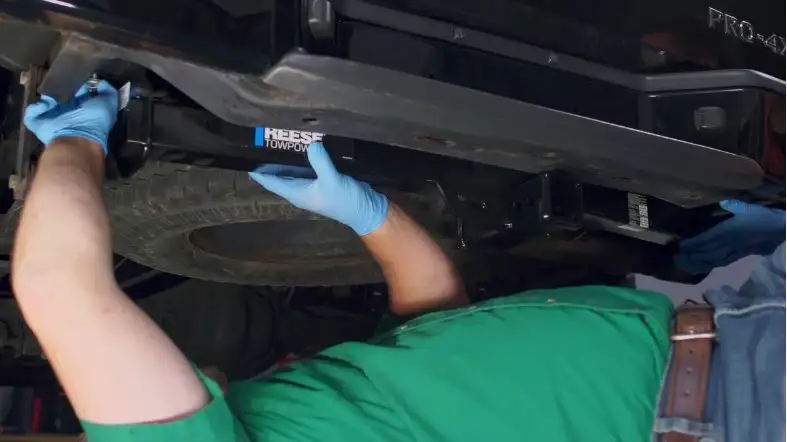
Different Types of Hitch Install Cost
Different types of hitch installation can cost differently.
Some might be less expensive than others, while some might be more expensive.
It all depends on several factors.
Let’s take a look at some of the different types of hitch installation costs that you might come across.
- Weight Distribution
- Pintle
- Fifth wheel installation
- Gooseneck installation
- Bumper mount installation
Weight Distribution Hitch Installation Cost
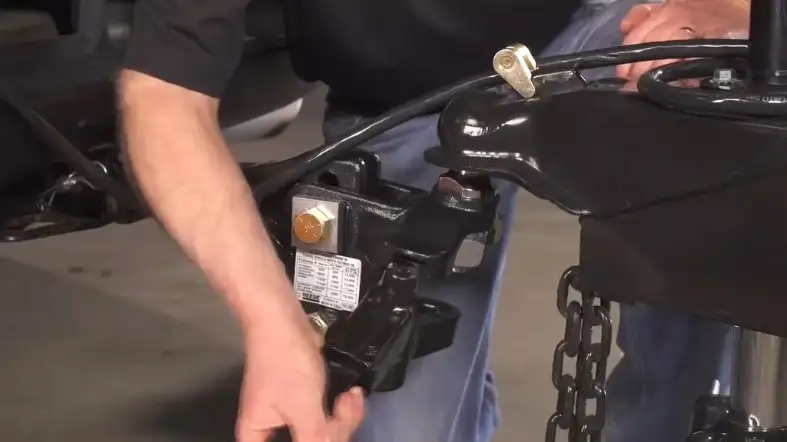
A weight distribution hitch installation will typically cost between $120 and $800.
This type of hitch is used when towing a very heavy load, such as a trailer or RV.
The weight distribution hitch evenly distributes the weight of the load between the front and rear axles of the vehicle.
Also, this type of hitch can help to improve the ride quality and handling of the vehicle.
If you think that you will be towing a very heavy load, then you should definitely consider getting a weight distribution hitch installed.
Pintle Hitch Installation Cost
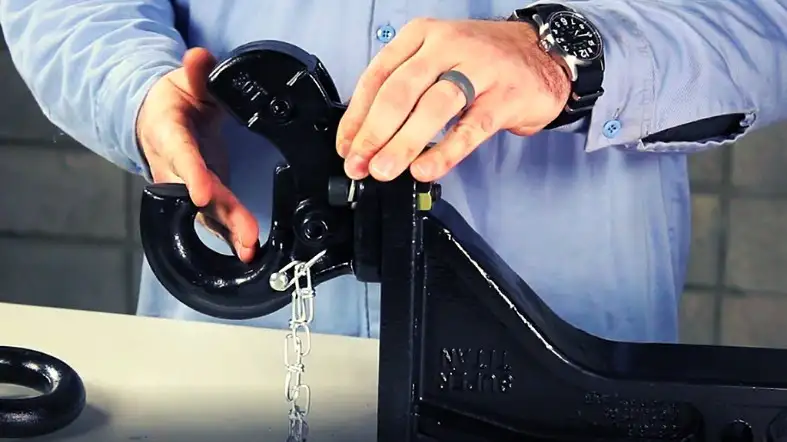
The cost of a pintle hitch installation will typically be between $100 and $300.
A pintle hitch is a type of hitch that is often used for towing trailers or RVs.
It is very similar to a weight distribution hitch, but it does not evenly distribute the weight of the load between the front and rear axles of the vehicle.
Instead, the weight is distributed more towards the rear axle.
This can help to improve the ride quality and handling of the vehicle when towing a heavy load.
Fifth wheel Hitch Installation Cost
If you have a Fifth wheel trailer, then you will need to have a fifth wheel hitch installed.
The cost of this type of hitch installation will typically be between $70 and $250.
The fifth wheel hitch is different from other types of hitches because it attaches to the vehicle at the bed of the truck instead of the bumper.
This type of hitch is very popular among people who have Fifth wheel trailers because it provides a much smoother ride.
Gooseneck Hitch Installation Cost
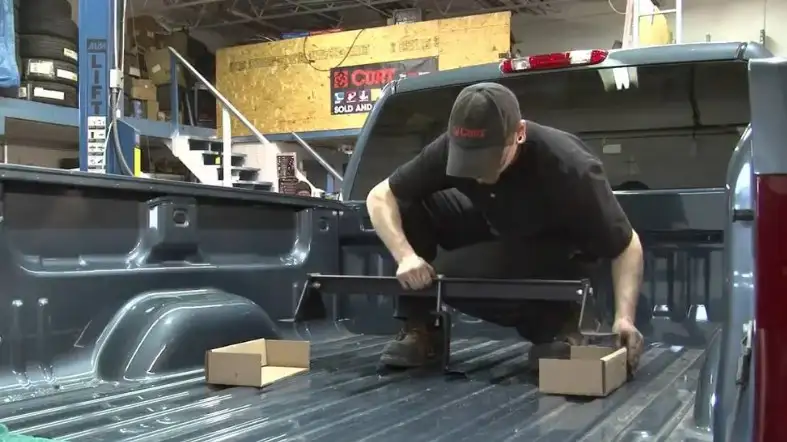
A gooseneck hitch installation will typically cost between $800 and $2800.
It is one of the most expensive types of hitch installations.
But it can give you a much smoother ride than a fifth wheel hitch because it attaches to the vehicle at the bed of the truck instead of the bumper.
In addition, the gooseneck hitch can be used with any type of trailer, not just Fifth wheel trailers.
So if you have a gooseneck trailer, then you should definitely consider getting a gooseneck hitch installed.
Bumper mount Hitch Installation Cost
A bumper mount hitch installation will typically cost between $200 and $600.
It is the most common type of hitch that is used for towing trailers or RVs.
The main advantage of a bumper mount hitch is that it is very easy to install and remove.
You can also use this type of hitch with any type of trailer.
So if you have a bumper-pull trailer, then you should definitely consider getting a bumper mount hitch installed.
How Much Does it Cost to Have a Gooseneck Hitch Installed?
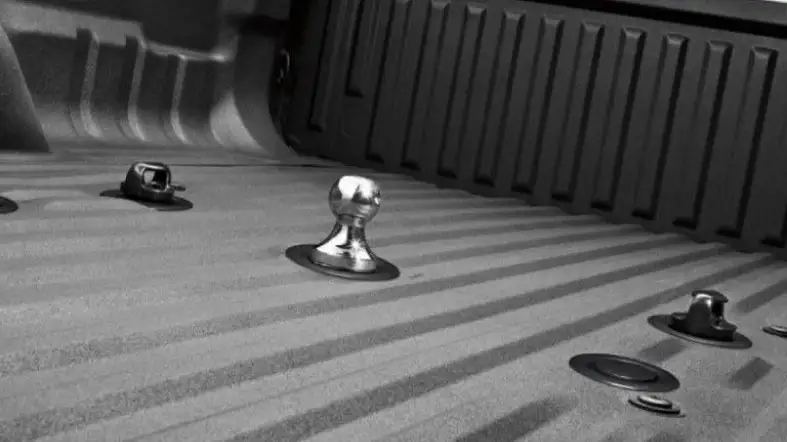
The cost of having a gooseneck hitch installed will vary depending on the make and model of your vehicle as well as the place of installation.
Generally, the cost for installation will be between $800 and $2800.
Before you begin, investigate the size of the hitch that is most advantageous for you so that you understand the expense.
If you’re wondering about the cost of having a gooseneck hitch installed, here are some steps to help you calculate it:
Parts and Materials
In order to install a gooseneck hitch, you will need to purchase the hitch itself as well as any additional parts or materials that might be required.
The price of the hitch will vary depending on the brand, model, and size.
So, be sure to do your research before making a purchase.
Installation Fees
Once you have all the necessary parts and materials, the next step is installation.
The cost of installation will vary depending on the place of installation.
If you choose to have it installed by a professional, the cost will be higher.
However, if you’re comfortable with doing it yourself, you can find installation instructions online and save some money.
As you can see, the cost of having a gooseneck hitch installed will vary depending on a few different factors.
Be sure to do your research so that you can get the best deal possible.
What Factors Affect The Cost Of Installing A Hitch?
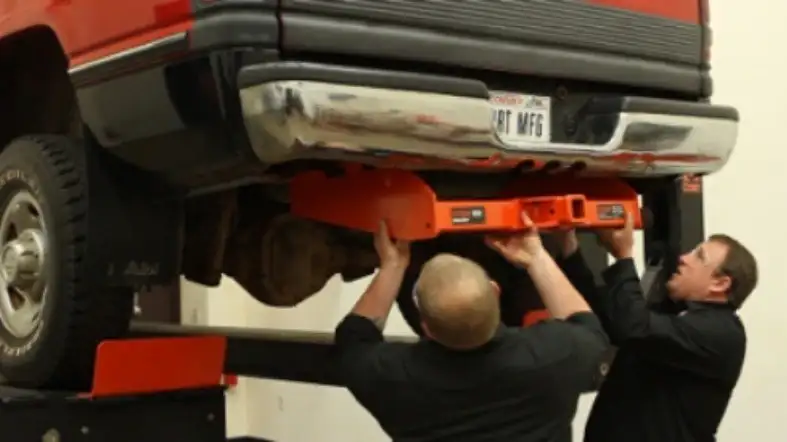
There are a few factors that can affect the total cost of installing a hitch.
These include:
Type of Vehicle
The type of vehicle you have will play a big role in the cost of installation.
Larger vehicles or those with complex electrical systems may require more time and labor to install a hitch, resulting in a higher total cost.
Besides the size of the vehicle, the make and model can also affect the price.
Some vehicles are easier to install a hitch on than others.
So, if you have a particularly difficult or rare vehicle, it may cost more to have a hitch installed.
Complexity of Installation
Another factor that can affect the cost is the complexity of the installation.
If your vehicle has a complex electrical system, the installation may be more difficult and time-consuming.
This can result in a higher total cost.
Keep in mind that some hitches require special tools or equipment to install, which can also add to the price.
Type of Hitch
The type of hitch you choose will also affect the cost of installation.
Some hitches are easier to install than others, while some may require special tools or equipment.
In general, simpler hitches will cost less to install than more complex ones.
Additional Services
In some cases, the company installing your hitch may offer additional services for an extra fee.
These can include wiring the hitch for trailer lights or providing a custom fit.
If you need these services, be sure to ask about them when getting a quote for installation.
Installation Location
Finally, the location of the installation can also affect the cost.
If you live in a rural area, it may cost less to have the hitch installed than if you live in a big city.
This is because labor costs tend to be lower in rural areas.
As you can see, there are a number of factors that can affect the cost of installing a hitch.
The best way to get an accurate quote is to contact a professional and have them take a look at your vehicle.
How to Install a Hitch Yourself?
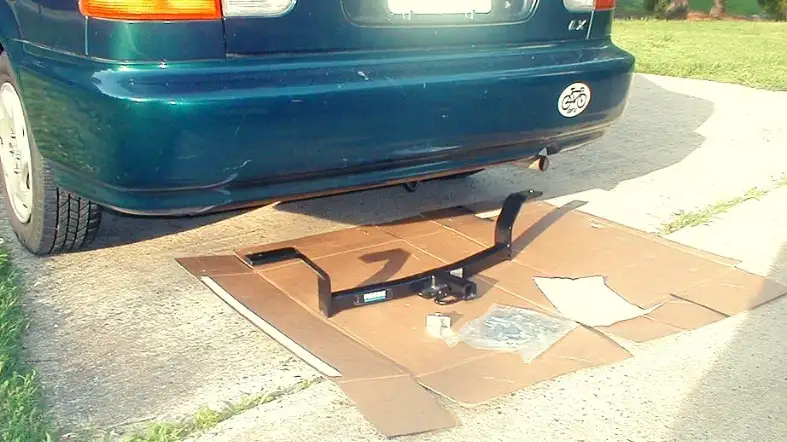
If you’re handy with tools and have some experience with electrical work, you may be able to install a hitch yourself.
However, it’s important to note that not all hitches can be installed by DIYers.
If you’re unsure about your ability to install a hitch, it’s best to leave it to the professionals.
To install a hitch, you’ll need a few tools, including a drill, socket set, and wrench set.
You’ll also need to purchase the hitch itself and any required installation hardware.
Once you have all the necessary materials, follow these steps:
Step 1: Read the Instructions
The first step is to read the instructions that come with your hitch.
This will give you a better understanding of the installation process and help you identify any special tools or equipment you may need.
If you don’t have the instructions, you may be able to find them online.
Step 2: Prepare the Vehicle
Before you start drilling holes in your vehicle, it’s important to take some time to prepare.
First, consult your vehicle’s owner’s manual to find the best location for the hitch.
Once you’ve identified the location, use a tape measure to mark where you’ll need to drill holes.
Then park your vehicle on a level surface and engage the parking brake.
Step 3: Drill the Holes
Once you’ve prepared your vehicle, it’s time to start drilling.
Using a drill and the appropriate-sized drill bit.
If your hitch came with a template, use it to drill the holes.
Otherwise, make sure the holes are large enough for the bolts to fit through.
Step 4: Attach the Hitch
With the holes drilled, it’s time to attach the hitch.
Begin by threading the bolts through the hitch and into the holes you drilled.
Then use a socket or wrench to tighten the bolts.
Be sure not to overtighten, as this could damage the threads.
Step 5: Install the Wiring
If your hitch came with wiring, follow the instructions that come with it.
In most cases, you’ll need to run the wires from the hitch to the taillights.
To do this, you’ll need to remove the trim around the taillights and drill a hole through which to run the wires.
Once the wires are in place, reattach the trim and connect the wires to the taillights.
Keep in mind that some vehicles may require special adapters to connect the wiring.
Step 6: Test the Hitch
Before you hit the road, it’s important to test your hitch to make sure it’s properly installed.
Start by hooking up a trailer and checking that the lights work.
Then take your vehicle for a test drive to make sure the hitch is secure.
Check that the trailer stays level and doesn’t wobble. If everything looks and works well, you’re ready to hit the open road!
As you can see, installing a hitch isn’t a difficult task.
However, it’s important to make sure you have the necessary tools and experience before attempting it yourself.
Benefits of installing a Hitch
There are a number of benefits to installing a hitch.
In the below section, we will discuss some of the main advantages of having a hitch installed.
Allows you to tow a trailer
One of the most obvious benefits of installing a hitch is that it allows you to tow a trailer.
This can come in handy if you need to move large items or drive long distances.
When properly installed, a hitch provides a secure connection between your vehicle and the trailer, ensuring safe and reliable towing.
Makes backing up easier
Another benefit of having a hitch is that it makes backing up easier.
Because the hitch is mounted on the back of the vehicle, it acts as a guide when reversing.
This can be especially helpful when backing up with a trailer. Also, it can be helpful when you are in parallel parking.
Provides Additional Storage
In addition to making towing and backing up easier, a hitch can also provide extra storage space.
So that will come in handy if you need to store larger items.
As a result, you won’t have to worry about them taking up space inside your vehicle.
Protects your Vehicle
Another benefit of installing a hitch is that it can help to protect your vehicle.
Always use caution when driving with a trailer, but if you do happen to hit something, the hitch will help to absorb some of the impact.
This can help to prevent damage to your vehicle.
As a result, it can save you money on repairs.
So, there you have it! These are just a few of the benefits of having a hitch installed.
If you’re looking for a way to make towing and storing easier, a hitch is definitely a good option.
Is it Worth it To Install a Trailer Hitch?
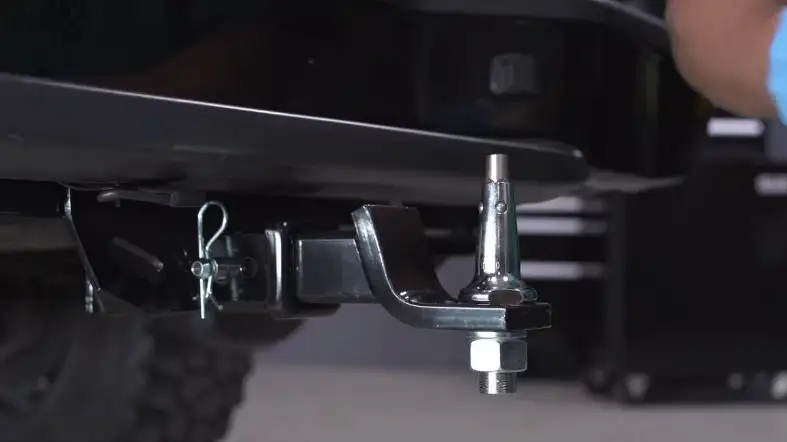
Now that we’ve discussed some of the benefits of installing a hitch, you might be wondering if it’s worth it.
The answer to this question depends on a few factors:
How often do you need to tow?
If you only need to tow occasionally, it might not be worth it to install a hitch.
However, if you need to tow frequently, a hitch can definitely be useful.
In addition, if you need to tow large items or long distances, a hitch is a must-have.
So, it’s really up to you to decide whether or not the benefits of having a hitch are worth the cost and effort of installation.
How much does it cost?
Another factor to consider is the cost.
If you’re able to install the hitch yourself, the only cost will be the price of the hitch itself.
However, if you need to pay someone to install it for you, the cost can add up.
So, you’ll need to decide whether the benefits of a hitch are worth the cost.
What type of vehicle do you have?
If you have a smaller vehicle, it might not be able to tow as much as a larger vehicle.
As a result, you might not need a hitch.
However, if you have a large vehicle that you frequently use for towing, a hitch can be worth the investment.
FAQs on how much it cost to have one installed
Does The Size Of My Vehicle Matter When Deciding If I Need A Hitch?
If you frequently need to tow large items or long distances, a hitch is a must-have.
However, if you have a smaller vehicle that you only use for occasional towing, it might not be necessary.
What Is The Duration Of Installing A Hitch?
Professional installation shouldn’t take more than an hour.
If you’re installing the hitch yourself, it will depend on your experience level and the difficulty of the installation.
Is It Difficult To Install A Hitch?
If you’re experienced with car repairs, you might be able to install the hitch yourself.
However, if you’re not confident in your skills, it’s best to leave it to a professional.
Does The Weight Of The Trailer Matter?
Yes, the weight of the trailer does matter.
You should always check the weight capacity of your vehicle before towing anything.
Overloading your vehicle can cause serious damage.
Conclusion
The cost of installing a hitch can vary greatly depending on the type of hitch, the make and model of your vehicle, and the location of the installation.
It is important to do your research and compare prices from different auto shops or dealerships to get the best deal possible.
Ultimately, the cost of a hitch installation is a small investment compared to the convenience and versatility it provides for hauling and towing.
